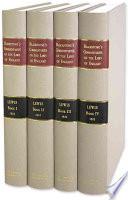Introduction, Section II http://avalon.law.yale.edu/18th_century/blackstone_intro.asp: Of the Nature of Laws in General
Commentaries on the Laws of England (1765–1769)
Works

Commentaries on the Laws of England
William BlackstoneFamous William Blackstone Quotes
Book II, ch. 1 http://avalon.law.yale.edu/18th_century/blackstone_bk2ch1.asp: Of Property in General.
Commentaries on the Laws of England (1765–1769)
“Man was formed for society and is neither capable of living alone, nor has the courage to do it.”
Commentaries on the Laws of England (1765–1769)
Source: Introduction, Section II: Of the Nature of Laws in General
Book I, ch. 1 http://avalon.law.yale.edu/18th_century/blackstone_bk1ch1.asp: Of the Absolute Rights of Individuals.
Commentaries on the Laws of England (1765–1769)
Introduction, Section II: Of the Nature of Laws in General
Commentaries on the Laws of England (1765–1769)
Book IV, ch. 14 http://avalon.law.yale.edu/18th_century/blackstone_bk4ch14.asp: Of Homicide.
Commentaries on the Laws of England (1765–1769)
William Blackstone Quotes
Book I, ch. 7 http://avalon.law.yale.edu/18th_century/blackstone_bk1ch7.asp: Of the King's Prerogative.
Commentaries on the Laws of England (1765–1769)
Context: In this distinct and separate existence of the judicial power, in a peculiar body of men, nominated indeed, but not removable at pleasure, by the crown, consists one main preservative of the public liberty; which cannot subsist long in any state, unless the administration of common justice be in some degree separated both from the legislative and the also from the executive power. Were it joined with the legislative, the life, liberty, and property of the subject would be in the hands of arbitrary judges, whose decisions would be then regulated only by their own opinions, and not by any fundamental principles of law; which, though legislators may depart from, yet judges are bound to observe. Were it joined with the executive, this union might soon be an overbalance for the legislative. For which reason... effectual care is taken to remove all judicial power out of the hands of the king's privy council; who, as then was evident from recent instances might soon be inclined to pronounce that for law, which was most agreeable to the prince or his officers. Nothing therefore is to be more avoided, in a free constitution, than uniting the provinces of a judge and a minister of state.
Book I, ch. 7 http://avalon.law.yale.edu/18th_century/blackstone_bk1ch7.asp: Of the King's Prerogative.
Commentaries on the Laws of England (1765–1769)
Context: In this distinct and separate existence of the judicial power, in a peculiar body of men, nominated indeed, but not removable at pleasure, by the crown, consists one main preservative of the public liberty; which cannot subsist long in any state, unless the administration of common justice be in some degree separated both from the legislative and the also from the executive power. Were it joined with the legislative, the life, liberty, and property of the subject would be in the hands of arbitrary judges, whose decisions would be then regulated only by their own opinions, and not by any fundamental principles of law; which, though legislators may depart from, yet judges are bound to observe. Were it joined with the executive, this union might soon be an overbalance for the legislative. For which reason... effectual care is taken to remove all judicial power out of the hands of the king's privy council; who, as then was evident from recent instances might soon be inclined to pronounce that for law, which was most agreeable to the prince or his officers. Nothing therefore is to be more avoided, in a free constitution, than uniting the provinces of a judge and a minister of state.
“Time whereof the memory of man runneth not to the contrary.”
Book I, ch. 18 http://avalon.law.yale.edu/18th_century/blackstone_bk1ch18.asp: Of Corporations.
Commentaries on the Laws of England (1765–1769)
Book I, ch. 13 http://avalon.law.yale.edu/18th_century/blackstone_bk1ch13.asp: Of the Military and Maritime States.
Commentaries on the Laws of England (1765–1769)
“It is better that ten guilty persons escape, than that one innocent suffer.”
Book IV, ch. 27.
Commentaries on the Laws of England (1765–1769)
Book IV, ch. 2 http://avalon.law.yale.edu/18th_century/blackstone_bk4ch2.asp: Of the Persons Capable of Committing Crimes.
Commentaries on the Laws of England (1765–1769)
Book IV, ch. 27 http://avalon.law.yale.edu/18th_century/blackstone_bk4ch27.asp: Of Trial, And Conviction.
Commentaries on the Laws of England (1765–1769)
Book III, ch. 17 http://avalon.law.yale.edu/18th_century/blackstone_bk3ch17.asp: Of Injuries Proceeding from, or Affecting, the Crown.
Commentaries on the Laws of England (1765–1769)
“What they do, no authority upon earth can undo.”
Commentaries on the Laws of England (1765–1769)
Context: Book I, ch. 2 https://lonang.com/library/reference/tucker-blackstone-notes-reference/tuck-202/: Of the Parliament.
